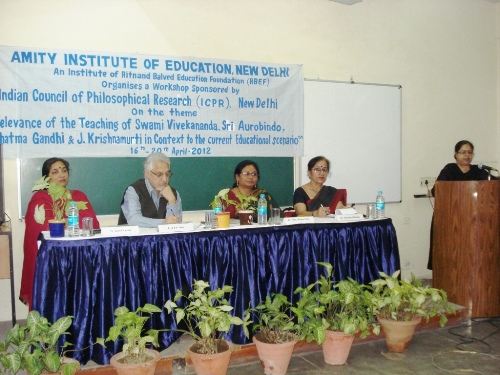16 Apr 2012-20 Apr 2012|Noida | Amity Institute of Education, New Delhi
"Education should be an instrument of transformation,” stress experts during a five day workshop at Amity Institute of Education, New Delhi

Amity Institute of Education, New Delhi organized a five day workshop on the theme “Relevance of the teachings of Swami Vivekananda, Sri Aurobindo, Mahatma Gandhi and J. Krishnamurti in context to the current educational scenario” from April 16-20 , 2012 at Amity Institute of Education, Amity Campus, Saket.
This workshop was conducted under a project granted by Indian Council of Philosophical Research (ICPR), New Delhi.
During the first day of the workshop, Mr. Debashish Mukherjee and Mr. Sukumar Lahiri from Ramakrishna Mission, New Delhi shared their views with the participants. Mr. Mukherjee lucidly explained Swami Vivekananda’s ideas of education which, Mr. Mukherjee shared, were quite ennobling and defined education as process of manifestation of one’s divinity and must result in character building, competence, confidence and compassion.
Mr. Lahiri gave an informative presentation on “Teacher as a change agent for building a better society” focusing on the role of Teacher, which ideally should be to facilitate learning, innovation and inculcate values in the students Mr. Lahiri also expressed his concern over how a faulty education system can lead to erosion of essential values and an increasing cynicism in society.
During the second day, while sharing important incidences from the life of Mahatma Gandhi, Mr. Ramesh Sharma, Director, Youth Activities, Gandhi Peace Foundation stressed that contemporary education should be based on culture and civilization of India, it should lead to the holistic development of the students involving body, mind and spirit, as envisioned and propagated by Mahatma Gandhi.
Ms. Anuradha from the Gnostic Centre, during the third day, talked about Mother and Sri. Aurobindo’s Philosophy and stressed that every man has to make a path to his journey of self-control, self-awareness and mental discipline. She opined that education should enable one to control his body and mind which will lead to the realization of his true potential. She highlighted the approach a teacher should adopt in the class to make the curriculum interesting with the help of story/ problem solving methods and other activities.
Ms. Monika Gupta from the Gnostic Centre expressed her ideas on the topic “A new education for new India” and stressed that education should arouse the interest of learners and the teacher should act only as a helper and guide without imposing anything on the impressionable minds of the students.
During the fourth day, Mr. Sant Raj Singh from Krishnamurti Centre, New Delhi familiarize the participants with the philosophy of Shri J. Krishnamurti and opined that education should not make conflict in the mind of a child, rather it should develop an inquisitive mind, as per the philosophy of Shri J. Krishnamurti who propagated that real education is about learning from life and awakening of intelligence to deal with the myriad problems of life.
The concluding day was graced by the presence of Dr. Sistla Rama Devi Pani- Editor, Newsletter, Association of Indian Universities and Head, Research Division, Association of Indian Universities, New Delhi, Prof. B.B. Dhar, Senior Vice President, RBEF, Director, Research and Innovation Coordination, Amity University –Uttar Pradesh, Dr. Rekha Ranade, Principal, Amity International School, Saket and Dr. Ranjana Bhatia- Prof. and Principal, Amity Institute of Education, New Delhi.
Dr. Sistla Rama Pani brought out the relevance of the teachings of the four philosophers- Swami Vivekananda, Sri Aurobindo, Mahatma Gandhi and J. Krishnamurti in the present scenario. She enlightened the audience with the thoughts and teachings of Dalai Lama according to which, “we all are living in a paradoxical world where we have taller buildings but shorter temples, more degrees and less sense and where we have added years to life but not life to years. We all have conquered the outer spaces of our lives but not our inner spaces.” She emphasized that the role of teacher is even more important in the midst of such a painful situation. “The teacher should show the path of righteousness to the students and incorporate all the ideals and values of all these great philosophers in their daily lives, only then we all would be able to make a difference to ourselves and to the society as well, “opined Dr. Pani.
Over thirty participants attended the workshop from different areas including school teachers, teacher educators and Ph.D Scholars from various schools and teacher training colleges of the NCR and adjoining states.